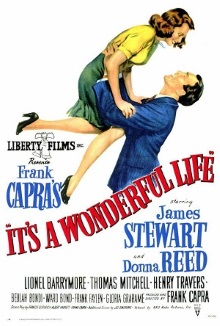
It’s a Wonderful Life is apparently one of America’s favorite films to watch during the Christmas season. That should give you a fairly good idea of what kind of movie this is. It also stars James Stewart, who together with Jack Lemmon, is becoming one of my favorite actors from the Golden Age of Hollywood. Out of his nearly a hundred or so roles, Steward seems to consider this one his favorite. At slightly over two hours long, it’s a fairly hefty film but at least one can be certain that it’s easy to watch.
Interestingly, the frame story is that we’re looking upon the life of one George Bailey of Bedford Falls from heaven. George is basically the model citizen, being a caring and compassionate person ever since he was a boy. He dreams of getting out of the small town he has been living in all of his life to see the world but time and time again, he chooses to sacrifice his own aspirations for the good of the people he cares for and for the town as whole. Yet one Christmas Eve, it seems that his archenemy the greedy capitalist Henry Potter has finally gotten the better of him and he is on the verge of committing suicide. So it’s up to his guardian angel to show him why he’s had a pretty wonderful life after all and why he’s richer than he thinks he is.
Just like Le Havre, this is sappy, sentimental stuff but I find that just because this is set so much further back in the past, I’m more willing to cut it some slack. It helps too this an inversion of Dickens’ A Christmas Carol, fantastical twist and all, so it doesn’t have to be grounded. Instead of Death showing a miser how worthless his life has been, here we have an angel showing a good man how great his life really is even if he doesn’t see it himself. The performances all around are great as well. My wife didn’t like how Lionel Barrymore is a mustache-twirling cardboard villain but in my opinion its a stylistic choice that fits in perfectly with the Dickensian feel of the story. Apparently the FBI at the time disliked it for being a Communist critique of American business. My personal favorite is Donna Reed as the impossibly sweet, best and most understanding wife ever.
As pleasantly enjoyable as it is to watch, it’s not hard to pick up the darker undertones in it that more contemporary critics have pointed out. It’s thoroughly depressing to watch Bailey have his dreams crushed to ashes over and over again. Leaving Bedford Falls and in his own words, its small town mentality, was what he’d always wanted but he never so much as steps one foot out of it, not even to get the college education he’d always wanted and that he surely deserved due to his intelligence. In the end he even becomes its champion against the “modernity” of Pottersville. The moral of this film is obviously that it’s all worth it in the end but it’s hard to imagine modern audience weighing the value of these choices the same way. I do know that Ayn Rand would have seen this as a great example of the soul-killing insidiousness of making a virtue out of selflessness.
Still, this is such a well-made, delightfully entertaining film that it’s hard not to like it. Henry Travers as the angel seeking to earn his wings deserves some chuckles and having Bailey visit the alternate version of his own town reminded me, in a good way, of the similar setup in Back to the Future. It hearkens back to a simpler, more innocent time that like all fairy tales never really existed, but I guess it’s okay to indulge oneself in a fantasy once in a while.